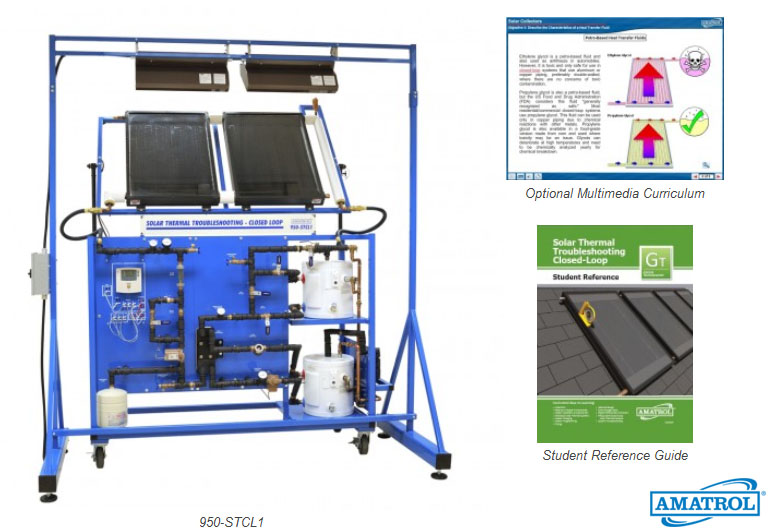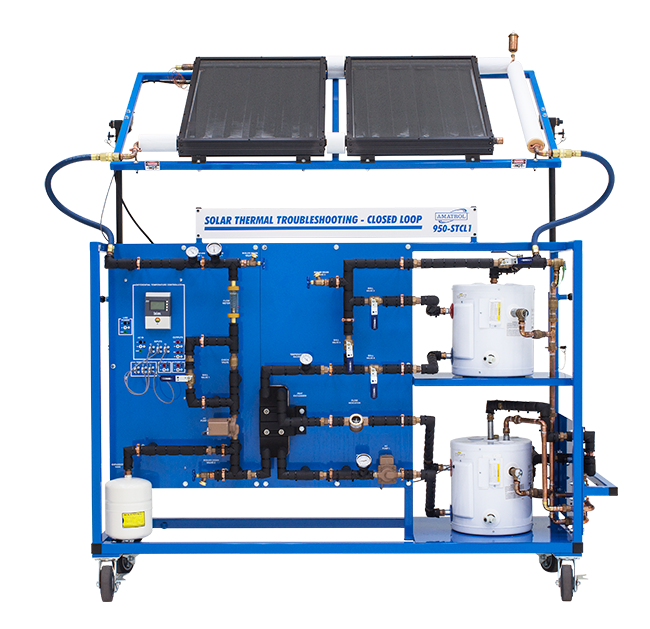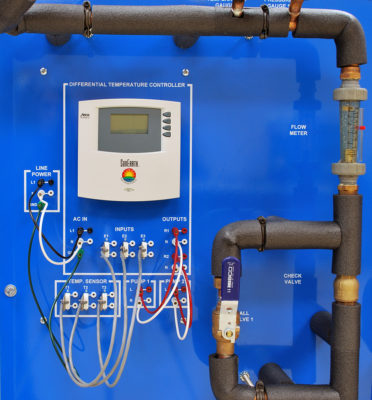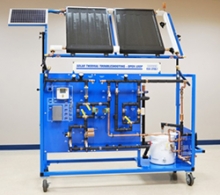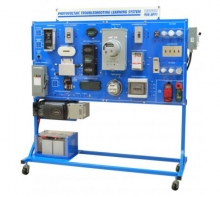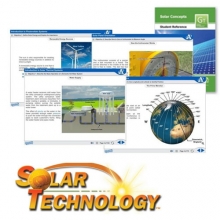Closed-Loop Solar Thermal Troubleshooting Training
What is a Solar Thermal System?
Unlike solar photovoltaic (PV) systems, which harness solar power to generate electrical power, solar thermal systems collect energy from the sun and convert it into heat.
Solar thermal systems transfer the heat generated from their solar collectors to residential or business water systems. Solar thermal systems are especially effective for businesses and residential properties that have a large hot water requirement.
What is the Difference between Closed-Loop and Open-Loop Solar Thermal Systems?
Solar thermal heating systems can be divided into categories: closed-loop systems and open-loop systems. So what’s the difference between these two types of systems?
In closed-loop systems, often called indirect systems, the solar collector panels contain a heat transfer fluid, such as a solution of antifreeze and water (glycol and water). This mixture absorbs heat and carries it to a heat exchanger in the cylinder, where heat is then transferred to the household water supply.
Closed-loop systems tend to be less efficient than open-loop systems because some heat is lost through the heat exchanger in the process of heat transfer. However, closed-loop systems are preferable in cold climates due to their use of freeze-resistant fluid.
In open-loop systems, often called direct systems, the solar collector panels heat water and send it back to the cylinder where it is then sent directly to taps or appliances for household use. Open-loop systems usually feature a temperature-controlled pump or similar system that will circulate hot water through the panel to prevent freezing during cold weather.
What Skills do Solar Thermal Technicians Need?
The growing interest in alternative energy and renewable resources has created a shortage of qualified solar thermal technicians throughout the green energy sector. So what are some of the essential skills that solar thermal technicians need to succeed?
Solar thermal technicians need basic knowledge and hands-on skills in a variety of foundational technologies, such as electrical, electronics, and fluid power, as well as advanced abilities related directly to the latest solar thermal technologies. Amatrol’s Solar Thermal Troubleshooting – Closed-Loop Learning System (950-STCL1) teaches a range of solar thermal troubleshooting skills for closed-loop systems through a unique combination of eLearning curriculum and hands-on experience with real industrial solar thermal components.
Amatrol’s interactive multimedia eLearning curriculum teaches solar thermal troubleshooting topics using text, audio, video, interactive quizzes, and stunning 3D animations to appeal to a variety of different learning styles. Learners begin with the basic solar thermal components, such as solar collectors, pumps, heat exchangers, and solar storage tanks.
From there, they steadily advance to more complex concepts and skills, including digital controllers; drainback system operation, charging, and troubleshooting; and pressurized closed-loop system operation, charging, and troubleshooting.
Learners using Amatrol’s eLearning will find that its comprehensive, detailed curriculum teaches both the foundational knowledge and practical hands-on skills they need to troubleshoot both drainback and pressurized closed-loop style solar thermal systems. It will also help students and workers prepare for solar certifications from the North American Board of Certified Energy Practitioners (NABCEP), the premier solar technology certification organization.
How Important is Hands-On Solar PV Skill Development?
To be fully prepared to enter the workforce, students and workers must possess more than just knowledge about relevant solar thermal troubleshooting concepts. Effective training must also focus on hands-on skill development with real industrial components.
Amatrol’s Solar Thermal Troubleshooting – Closed-Loop Learning System features a wide variety of industry-standard solar thermal equipment to teach relevant hands-on skills. For example, the 950-STCL1 includes a mobile workstation with a centrifugal pump, heat exchanger, digital differential controller, temperature probe, vacation bypass, check valves, relief valves, flow meters, tempering valves, solar storage tank, drainback tank, expansion tank, multiple component circuit panels, and two solar collectors.
For a complete solar thermal troubleshooting training experience, the required Solar Thermal Sun Simulator (95-STS1) provides the heat energy needed to simulate the sun’s solar energy when the training system is being used indoors.
What’s the Best Way to Teach Solar PV Troubleshooting Skills?
The hallmark of a highly skilled solar thermal technician is the ability to effectively troubleshoot solar thermal systems at both the component and system levels. So how do students and workers acquire these essential troubleshooting skills?
Amatrol’s Solar Thermal Troubleshooting – Closed-Loop Learning System features a wide array of both electrical and fluid faults that allow instructors to replicate realistic system and component failures. Learners will practice independently solving the many common types of situations they will encounter on the job.
Learning Topics
- Balance of System Components
- Digital Differential Controllers
- Collectors
- Pressurized Closed-Loop Solar Thermal Systems
- System Operation & Adjustment
- Drainback Solar Thermal Systems
- System Charging
- System Programming
- Solar Storage Tanks
- Heat Exchanger
- System Troubleshooting
- Pumps
Key Features
- Two Types of Closed-Loop Thermal Systems
- Replicates Real-World Thermal Systems
- Fault Insertion for Both Electrical and Fluid Systems
- Balance of System Components
Options
- Solar Thermal Cold Water Supply Station (95-STW1)
- Solar Concepts Learning System (950-SC1)
- Solar Instruments Package (95-SIP) (for outside use)
Requirements
- Solar Thermal Sun Simulator (95-STS1)
- Solar Thermal Charging Station (95-STCS1)
- Computer: See requirements
- Electricity (120 VAC/60 Hz/1 phase)
More Information
Solar Thermal Sun Simulator Training | Adds to 950-ST
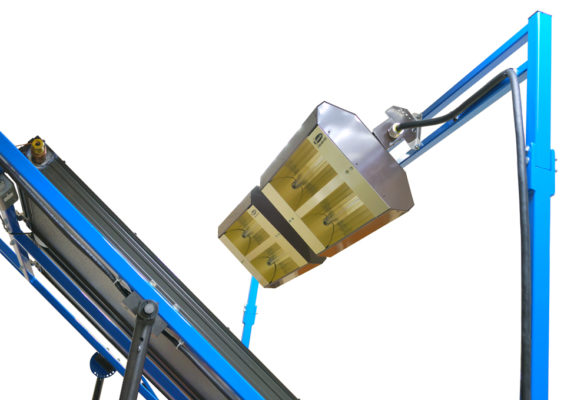 Instructors are often faced with challenges in teaching solar when faced with inclement weather. The Solar Thermal Sun Simulator training provides the heat energy needed to simulate the sun’s solar energy when the solar thermal installation system is being used indoors. Amatrol offers an optional sun simulator, the 95-STS1, for use indoors with the 950-STCL1 and the 950-STOL1. This simulator provides thermal energy to simulate solar thermal power for commercial and residential systems.
Instructors are often faced with challenges in teaching solar when faced with inclement weather. The Solar Thermal Sun Simulator training provides the heat energy needed to simulate the sun’s solar energy when the solar thermal installation system is being used indoors. Amatrol offers an optional sun simulator, the 95-STS1, for use indoors with the 950-STCL1 and the 950-STOL1. This simulator provides thermal energy to simulate solar thermal power for commercial and residential systems.
The Solar Thermal Sun Simulator training includes a stationary frame, sun simulator lights with heater assembly, and power box and cable. The light positions are adjustable. This system requires a 3-Phase 208 VAC 4-Wire electrical service.
Additional Requirements: Electricity (208 VAC/60 Hz/3 phase)
Solar Thermal Cold Water Supply Station Training
Adds to 950-ST
 The Solar Thermal Cold Water Supply Station training is designed to reduce the temperature of hot water from the open-loop (950-STOL1), closed-loop (950-STCL1), or installation solar thermal (950-STF1) learning systems and feed it back to the learning system at a temperature and pressure that is similar to a city water supply. This system will enable the three solar thermal learning systems to be self-contained. The Solar Thermal Cold Water Supply Station training includes the frame, AC pump, AC chiller, water storage tank, ball valves for shutoffs and bypasses, relief valve to adjust temperature and pressure output, temperature gauges, a pressure gauge at outlet of chiller, control unit, ground fault circuit interrupter, and an AC circuit breaker with lockout / tagout.
The Solar Thermal Cold Water Supply Station training is designed to reduce the temperature of hot water from the open-loop (950-STOL1), closed-loop (950-STCL1), or installation solar thermal (950-STF1) learning systems and feed it back to the learning system at a temperature and pressure that is similar to a city water supply. This system will enable the three solar thermal learning systems to be self-contained. The Solar Thermal Cold Water Supply Station training includes the frame, AC pump, AC chiller, water storage tank, ball valves for shutoffs and bypasses, relief valve to adjust temperature and pressure output, temperature gauges, a pressure gauge at outlet of chiller, control unit, ground fault circuit interrupter, and an AC circuit breaker with lockout / tagout.

